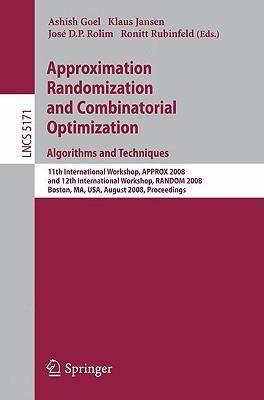Approximation, Randomization and Combinatorial Optimization. Algorithms and Techniques(English, Paperback, unknown)
Quick Overview
Product Price Comparison
This volume contains the papers presented at the 11th International Wo- shop on Approximation Algorithms for Combinatorial Optimization Problems (APPROX 2008) and the 12th International Workshop on Randomization and Computation (RANDOM 2008), which took place concurrently at the MIT (M- sachusetts Institute of Technology) in Boston, USA, during August 25-27, 2008. APPROX focuses on algorithmic and complexity issues surrounding the development of e?cient approximate solutions to computationally di?cult problems, and was the 11th in the series after Aalborg (1998), Berkeley (1999), Saarbru ?cken (2000), Berkeley (2001), Rome (2002), Princeton (2003), Cambridge (2004), Berkeley (2005), Barcelona (2006), and Princeton (2007). RANDOM is concerned with applications of randomness to computational and combinatorial problems, and was the 12th workshop in the series following Bologna (1997), Barcelona (1998), Berkeley (1999), Geneva (2000), Berkeley (2001), Harvard (2002), Princeton (2003), Cambridge (2004), Berkeley (2005), Barcelona (2006), and Princeton (2007). Topics of interest for APPROX and RANDOM are: design and analysis of - proximation algorithms, hardness of approximation, small space, sub-linear time, streaming, algorithms, embeddings and metric space methods, mathematical programming methods, combinatorial problems in graphs and networks, game t- ory, markets, economic applications, geometric problems, packing, covering, scheduling, approximate learning, design and analysis of randomized algorithms, randomized complexity theory, pseudorandomness and derandomization, random combinatorial structures, random walks/Markov chains, expander graphs and randomness extractors, probabilistic proof systems, random projections and - beddings, error-correcting codes,average-case analysis, property testing, com- tational learning theory, and other applications of approximation and randomness.


